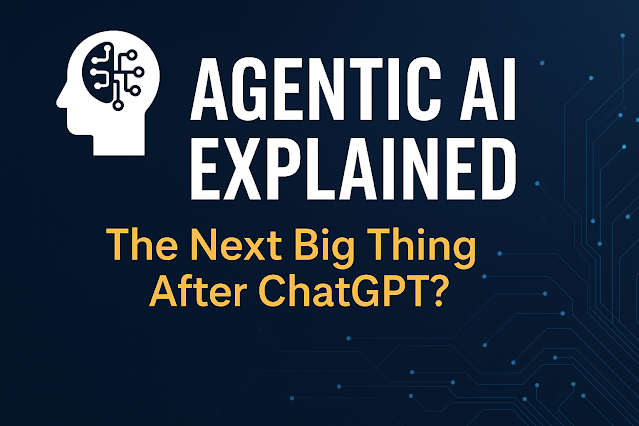Agentic AI Explained: The Next Big Thing After ChatGPT?
🤖 What is Agentic AI?
Agentic AI refers to a new class of artificial intelligence systems that don’t just respond to prompts — they act autonomously, plan multi-step tasks, and pursue goals without constant human input.
Unlike traditional AI (e.g., ChatGPT), which waits for user input and then responds, Agentic AI systems can:
-
Set their own objectives based on context
-
Execute tasks independently
-
Adapt and revise their plans dynamically
Think of it as the difference between a calculator (traditional AI) and a personal assistant that books your flights, checks weather, and updates your calendar on its own (Agentic AI).
🌟 Why Is Everyone Talking About Agentic AI in 2025?
Since early 2024, companies like OpenAI, Google DeepMind, Meta, and Anthropic have accelerated development of autonomous AI agents.
In 2025, the term Agentic AI exploded into public awareness after OpenAI’s announcement of “auto-agents” capable of:
-
Browsing the internet
-
Scheduling tasks
-
Writing and executing code
-
Making decisions based on feedback
Big players are now testing agentic systems for use in:
-
Finance (auto-trading agents)
-
Cybersecurity (threat hunting bots)
-
Marketing (campaign optimization bots)
-
Education (personalized tutoring agents)
🧠 How Does Agentic AI Work?
Agentic AI relies on three core components:
|
Component |
Function |
|
Large
Language Models (LLMs) |
Understand
and generate human-like language (e.g., GPT-4, Claude) |
|
Memory
Systems |
Store and
recall past interactions and world knowledge |
|
Planning
& Execution Engines |
Break down
goals into subtasks and execute them (like BabyAGI, AutoGPT, LangChain) |
An agentic AI asked to “Plan my trip to Tokyo” might:
-
Check your calendar
-
Book flights and hotels
-
Create a sightseeing itinerary
-
Notify you via email or mobile
All without further human interaction.
🛠️ Tools Powering Agentic AI
Here are some frameworks and tools that developers are using to build Agentic AI in 2025:
-
🔗 LangChain – For chaining LLM calls with external tools
-
🧠 AutoGPT – Self-prompting, goal-seeking AI agent framework
-
🧭 CrewAI / BabyAGI – Task management and agent coordination
-
🧰 OpenAI Function Calling – Helps AI interact with APIs and tools directly
-
💾 Pinecone / Weaviate – Vector databases for memory and retrieval
Tip: If you're a developer, explore open-source Agentic AI kits like SuperAGI and experiment on your own projects.
🧩 Agentic AI vs ChatGPT: Key Differences
|
Feature |
ChatGPT |
Agentic AI |
|
Requires
Human Input |
✅
Always |
❌
Can act independently |
|
Memory |
❌
(limited) |
✅
Long-term memory |
|
Goal Planning |
❌ |
✅ |
|
Real-world
Autonomy |
❌ |
✅ |
|
Self-Improvement |
❌ |
✅
(in future versions) |
🔒 Challenges and Ethical Concerns
Despite the excitement, agentic systems raise critical concerns:
-
Safety & Alignment: What if the AI pursues a harmful or unintended goal?
-
Autonomy Abuse: Malicious use in spam, fraud, or cyberattacks
-
Control: Who’s responsible if an AI causes damage?
-
Privacy: How much data should agents access to act effectively?
Regulation, transparency, and ethical design will be key to safe deployment.
📈 Future of Agentic AI: What’s Coming Next?
By 2026, we may see:
-
Agent marketplaces (downloadable agents for work, shopping, travel)
-
Enterprise AI Assistants managing teams and operations
-
Open-source agentic platforms for startups and devs
The future isn’t just smarter AI—it’s AI that works for you without needing to be told every step.
📝 Final Thoughts
Agentic AI is not science fiction anymore. It's a leap beyond conversational AI, merging reasoning, autonomy, and memory into real-world applications.
If ChatGPT was the ignition spark, Agentic AI is the next evolution of machine intelligence—with the power to revolutionize work, productivity, and everyday life.
📣 Let’s Discuss!
Would you trust an AI agent to manage your calendar, money, or business?
Share your thoughts in the comments below ⬇️



Comments
Post a Comment